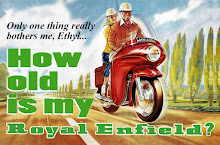Royal Enfield's "head of global brands," effective immediately, is Mumbai marketing guru Shubhranshu Singh.
He could be a pivotal choice for Royal Enfield's future in lands outside India.
Royal Enfield, a powerhouse brand in India, is fondly remembered in Britain, vaguely remembered in Canada and Australia and little remembered in the United States and most everywhere else.
Singh has put his thoughts about marketing into guest columns for exchange4media.com
These make interesting reading. One is entitled "India has no global brands of any consequence." (There are global Indian businesses, but no global Indian brands, he writes.)
So what? Well, he points out, global brands can withstand the shock of economic crisis in any one country, and have the strength to ride out even international downturns. There's also the fact that, whatever you think of them, "they rule consumer minds."
Obviously it is an advantage to be a global brand and Royal Enfield ought to strive to become one.
Why is it that India has no great global brands of its own although India owns a variety of signature "Western" brands (Jaguar Land Rover), makes a lot of what goes into Western products, and possesses enormous marketing and Information Technology muscle?
"Western brands and the Empire came hand in hand," Singh writes. "They were the products of a mass production world enabled by the Industrial Revolution and fostered through the rise of affluence, media and literacy in Europe and America."
He doesn't mention it but, of course, the name "Royal Enfield" tells you everything. Royal Enfield rode into India at a time the newly independent nation needed motorcycles and Britain, a familiar supplier, had just the motorcycle it wanted.
Now India has Royal Enfield and deep devotion to it; how can it become the motorcycle the world knows and wants?
Singh effectively lays out the necessary steps, in reverse, when he explains why Indians are "not a brand building people." Turning these around, they are:
Brand stature is not about immediate profit.
Brand sensibility must be the concern of the entire organization, not just the marketing department.
Brand building demands discipline and persistence.
Brand appeal to global customers requires building awareness and trust.
Sounds great.
And there's something else Singh mentions that strikes me as interesting.
With globalization, does it even matter where a brand is "from"? Does it matter that my iPhone is "Designed in America" when it is made in China? By extension, does it even matter that a Royal Enfield is a "Brit style" motorcycle when it is made in India?
Singh says it does matter.
"The irony is that the more we globalize, the more the rootedness and urge to belong becomes stronger."
Within India, Royal Enfield is tremendously active in marking itself as an Indian brand. It sponsors massive events for riders, and its newest motorcycle in the marketplace, the Himalayan, was introduced in Delhi in 2016.
Yet, even as its sales in India exploded in recent years, Royal Enfield has sought to emphasize its long ties to Britain.
The Continental GT cafe racer, a style of motorcycle especially British, was introduced to the world at Brooklands race track in 2013. Royal Enfield honored the British dispatch riders of World War II at the prestigious Goodwood Revival in 2014. It opened its new technical facility at Bruntingthorpe Proving Ground in 2015.
In April, 2018 Royal Enfield CEO Siddhartha Lal personally showed Britain's Prince William the coming Royal Enfield 650 Interceptor, on display at an economic conference at Westminster.
In May, a limited edition Pegasus model was introduced at the Imperial War Museum in Duxford, with a background of British military equipment and soldiers.
As head of global brands for Royal Enfield, Singh could continue to shape Royal Enfield as an Indian brand in India, but a legacy British brand in the world. Or he could take a new road.
The Vintagent Trailers: Holy Cow
-
Achieving adulthood is like making Comté cheese.
The post The Vintagent Trailers: Holy Cow first appeared on The Vintagent.






























No comments:
Post a Comment